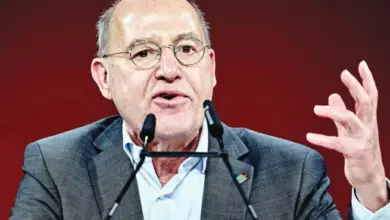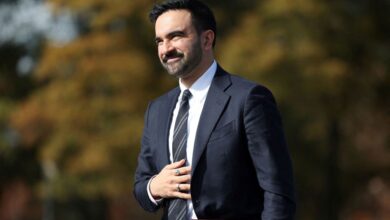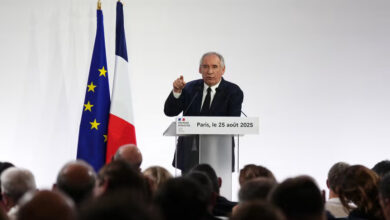The mere suggestion by Mohamed ElBaradei that he may consider running for president, given certain preconditions, has thrown media outlets into a speculative frenzy. Who is this man exactly? What’s his plan? Could he succeed? And can he bring anything new to the table?
Reflecting this delirium, ElBaradei’s name has registered 100 points on Google’s “increased interest” scale for searches between 17-21 February, and the Facebook group “ElBaradei for presidency of 2011” has already exceeded 100,000 members, quickly surpassing membership of the “April 6 youth movement.”
ElBaradei’s return to Egypt last Friday has been making recurrent headlines on international news networks, while local media outlets are scurrying to cover his past, present, and possible future.
Saturday and Sunday night saw the two most in-depth such attempts, one in the form of an interview with Orbit’s Amr Adeeb on Al-Qahira Al-Youm, the other with Mona el-Shazly on Dream TV’s daily magazine show, Al-Ashera Masa’an.
Several key points can be established from these grueling interviews, el-Shazly’s lasting nearly three consecutive hours. The first is that ElBaradei is adamant about conveying the message that he is not interested in becoming president per se, but rather in the change that such a position may allow him to carry-out.
“I want to change the country,” he said on Adeeb’s interview, “and if the way to change it is to become president, then first I want that opportunity, then I will decide whether I will run.”
However, a point he emphasized in both interviews is that, whether he gets elected or not, his mission is the same: “I have a vision […] I will still go on to talk about the need for change regardless of my position.”
Also clear from the interviews is that ElBaradei does not accept any of the working definitions of democracy as employed by the current regime. Adeeb at one point told ElBaradei that the constitutional changes that took place in 2005 and 2007–the ones effectively barring him from legally running for president at the moment–were democratically chosen by representatives of the public in the People’s Assembly.
To this, ElBaradei refuted any notion that the parliament actually represents the Egyptian people, much to Adeeb’s dramatized shock, and he went on to ask Adeeb whether he had ever seen a democracy in which opposition parties comprise 3 or 5 percent of a parliament.
He added: “Any democracy where the opposition has less than 40 or 45 percent isn’t a democracy […] I don’t believe the parliament expresses the true will of the 80 million in this country.”
Likewise, ElBaradei brushed aside any notion suggested by el-Shazly that Egyptians might benefit from the stability of the current regime. “Let’s not fool ourselves,” he said, “If a person can’t find food, can’t find medical treatment, nor education, there’s no stability.”
He made a similar point later: “It’s not an achievement just to become a president, while 42 percent of the people continue to be unable to eat or drink.”
One of the criticisms of ElBaradei voiced in state-owned papers concerned why he might think he can offer anything different. This sentiment was channeled by Adeeb, who asked ElBaradei how he can guarantee to accomplish the fundamental changes he’s calling for.
To this, ElBaradei replied that he could not guarantee them. “But I can tell you that at least if I fail, you can hold me accountable, at which point there will be a change of power.” ElBaradei also pointed out that, of the world’s 114 democracies, there is none where the president has the right to run more than twice.
He later posed the problem to Adeeb as follows: “We are in a strange place in Egypt. I can’t form a party, and if I did, I’d have to go to the ruling one to get permission […] and even if they agreed, I wouldn’t be able to run for president for another five years. So this door is closed.”
Another issue raised and settled within the two interviews was a claim made by Al-Ahram’s Editor in Chief, Osama Saraya, that ElBaradei holds dual-citizenship. He responded that at no point has he possessed any other passport aside from an Egyptian one, and noted his dismay that the chief editor of a large paper has no moral qualms about blatant lying. “If I had the time, and I don’t, I would have taken him [and taken him out] in the courts, but I won’t go down to that level.”
Taking things personally, however, does not seem to be part of ElBaradei’s game plan. He was at pains to spell out in his interview with Adeeb that he is not interested in criticizing individuals such as the president, but only their policies.




